Peter MALONE
Saturday, 18 September 2021 19:51
CBGB
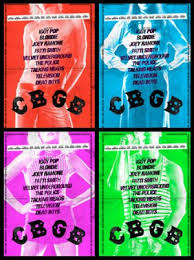
CBGB
US, 2013, 101 minutes, Colour
Alan Rickman, Donal Logue, Alan Rickman, Marlin Akerman, Justin Bartha, Richard de Klerk, Johnny Galecki, Rupert Grint, Freddy Rodriguez, Bradley Whitford.
Directed by Randall Miller.
CBGB is a film for music specialists, especially those interested in the growth of groups in the latter part of the 20th century, especially in the United States, in New York. The title refers to the name of the club purchased and developed by entrepreneur, Hilly Krystal, who had a talent for discovering talent but who was without talent in financial management.
One of the surprises of the films is to see Alan Rickman in the central role of Hilly Krystal, with his makeshift approach to life, to his club, to his bankruptcies, to his interactions with the musicians, giving an opportunity to play, wanting only original music. Rickman does not look like himself and other films, he with shabby clothes, uncontrolled hair, wandering through life and literal dirt to achieve his ambitions for music in the club. He originally wanted country and blues music but what developed was the Punk movement of the 1970s and 80s, with his being considered a godfather of Punk.
Included in musicians playing at his club were Patti Smith, The Ramones, Talking Heads. Talking Heads honoured him at their induction into the Hall of Fame at which he was present.
Audiences not familiar with the characters or the music may be put off at first, but the film is worth a look for the performances and this glimpse of developments in popular American music.
1. The film for those who know about 20th-century American music, its history? Punk? A portrait of an era?
2. The story, characters? Hilly Krystal, his personality, love of music, his grungy lifestyle, an idealist, his talents for picking musical ability, the ups and downs of his life, achievement? Talking Heads and their inviting him to the Hall of Fame ceremony?
3. The US in the 1970s and 1980s, New York City, the Bowery, the streets, the dirt, the club, the dog and excrement and the rats, performances, the feel of the club? Music? Business, competence and incompetence?
4. The range of groups, original music, the auditions, the types of musicians, their look, clothes, hopes? Punk? The Dead Boys?
5. The visuals of the film, conventional? But the use of illustrations throughout the film from the magazine, Punk, the artist as a character, his friend, the ambitions of the magazine, the interviews, the contributors? The frames, the captions, the information, the legal, cartoonlike?
6. Alan Rickman as Hilly, his appearance, hair, clothes, his background, his mother, borrowing money? The absence of information about his wife and son, the presence of his daughter? His friends, Merv and his support? The bankruptcies, the visits to the bank? Borrowing?
7. The club, his ambitions, the venue, buying the property, the signs, CBGB, the subtitle? The space, for performance, for audiences? The office? Lisa and the finances and working in the office?
8. The drug addict, and his presence, Hilly helping him, his interest in the club? Taxi, his background, the sound mixing, his wanting to leave, his staying, the final tribute to his work? Merv, his hardhat, clashes, advice, friendship?
9. The variety of performers: Patti Smith, Talking Heads, The Ramones, Television, Iggy Pop, the Dead Boys – the details of the performances?
10. The cartoonist, his work, the magazine, his friendship with Mary Herron, the film director? The agents, especially the woman wanting to get the finances for the Dead Boys? Going on the road, their personalities, punk, ignorant, performances, the destruction of their vehicle and the instruments? Hilly giving them a second chance?
11. Hilly’s mother, the loans, her visit to the bar, people looking after her?
12. Lisa, her angers, her reaction to her father, wanting to help, get a job, her studies, taking over the finances, the bookings, all the paperwork and her getting it in order?
13. Hilly, surviving over the decades, the difficulties, his achievement?
14. The final information before the final credits about the characters and their careers?
Published in Movie Reviews
Published in
Movie Reviews
Tagged under
Saturday, 18 September 2021 19:51
Don Jon
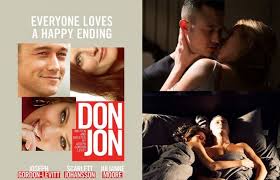
DON JON
US, 2013, 90 minutes, Colour.
Joseph Gordon -Levitt, Scarlet Johansson, Julianne Moore, Tony Danza, Glenne Hedley, Brie Larson, Robert Brown, Jeremy Luke, Paul Ben- Victor.
Directed by Joseph Gordon- Levitt.
Don Jon is a reminder of the the famous John of legend and opera, the man with a voracious sexual appetite, Mozart’s Don Giovanni amongst other stories.
However, this is a rather small story of a man around 30, his sexual addiction, his sitting at his laptop, his sexual behaviour and the aftermath. While he has had sexual relationships with women, they don’t seem fulfilling compared with his laptop experience, usually going from the bed to his desk for a supplementary sexual experience. When he does fall in love with a young woman, it seems to be a fulfilment but he still goes to his desk and she catches him, branding him a liar, he making many excuses and lying, and the couple break up.
This is a pity for his parents, an Italian family, when he goes often for meals, brings the girlfriend who charms the parents. They are also Catholic and go to mass, Jon going to confession every week, meticulously reciting the number of sexual encounters as well as his masturbation with pornography, the invisible priest giving him penances which go up and down depending on the volume of the confession. Actually, this is a critique of the priest who is never seen, only his voice heard, listening to the same confessions, giving various penances, but merely going through a routine, and not finally engaging at all with Jon.
The other principal character is a widow Jon encounters at the University. They talk, he helps with her studies, she explains that her husband and child were killed in an accident. She has glimpsed him watching pornography in the lecture room on his phone and challenges him. In their own sexual relationship, he is actually able to lose himself, as she advises that true love is, and perhaps he has some hope in being able to give up his addiction.
Joseph Gordon- Levitt wrote the film, directed and acts as Jon, quite an investment in the film. Scarlet Johansson is Barbara, beautiful (but off-putting as she chews gum). Abbott’s John sister who realises that Barbara would have wanted to dominate rather than love him. The parents are played by Tony Danza and Glenne Hedley. The of the central character is the widow who is played with some strength by Julianne Moore.
1. The work of Joseph Gordon- Levitt, writing, directing, acting? His personal investment in the issues, the critique?
2. The city, apartments, restaurants, homes – ordinary USA?
3. A film for audiences in their 20s and 30s, challenging their own experience, knowing the kinds of characters, the issues, the challenges?
4. The focus on sex addiction, sexual needs, action, the conviction that they could stop – but could not?
5. Pornography, visual, the websites, the availability, Pornhub, laptop connections, sitting and watching, masturbation, the tissues, the effect? Jon and his saying he was lost in the porn experience rather than in the reality of love-making?
6. Relationships, friendships, talk, sexual behaviour, less fulfilling in reality than with the computer?
7. His friends, going to the bars, their talk, sex? Seeing Barbara, her beauty, glamour, yet her chewing gum, drinking, dancing, distance from Jon, but the relationship, the pause, her values, her parents, her friends? Her visit to John’s parents, the meal, charming, helping his mother, the attraction of his father, the final estimation from John’s sister?
8. Jon, his age, work, experience, relationships, not satisfactory, reliance on porn, this trend for the rest of his life?
9. Jon and his relationship with his parents, his father’s expectations, nagging, the tension with his father, love his mother, his sister and her continually texting every meal?
10. The relationship with Barbara, her finding him watching the pornography, her disgust, his lies, excuses? The break? Barbara cutting him off? The final conversation at the cafe, talk, but the reaction be?
11. The parents, Italian, long marriage, shouting, the response to Barbara? His sister and her finally speaking, correctly noting that Barbara wanted to dominate John?
12. The family going to church, to mass, his continually going to confession, every week, the exact detail of his encounters, of pornography masturbation, the priest and his penances, their going up and down depending on Jon’s confession? His exasperation with the priest? The priest and his anonymity, hearing only his voice, the routines of listening and the penance, the priest and the breaking off with Jon, the routines of his ministry?
13. Esther, seeing her crying, her apology, going to the course, catching John with his phone and the pornography, talking with him, her story, widow, the death of her husband and child, her weeping? The sexual encounter, her wise advice about love, losing oneself, Jon learning of this, the hopes that he could give up his pornography, overcome his addiction?
14. The tackling of an unusual subject, bringing it into the open, the realities, the critique?
Published in Movie Reviews
Published in
Movie Reviews
Tagged under
Saturday, 18 September 2021 19:51
100-Year-Old Man who Climbed out the Window and Disappeared, The
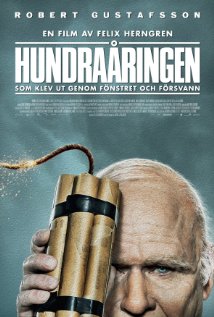
THE 100-YEAR-OLD MAN WHO CLIMBED OUT THE WINDOW AND DISAPPEARED
Sweden, 2013, 114 minutes, Colour.
Robert Gustafsson Iwar Wiklander, David Wiberg, Mia Skaringer, Alan Ford.
Directed by Felix Herngren.
This is a title that a customer might have to memorise exactly while going to the box office, especially when this cinema is also screening The Hundred- Foot Journey – even this reviewer, with clarity of diction, was given a ticket for the journey instead of the old man!
The novel has a strong reputation in Scandinavia. And local audiences there have enjoyed the adaptation. For audiences who haven’t read the novel, it probably won’t have the same impact. And the other difficulty would be the particularities of the Scandinavian humour (which another member of the audience stressed that she understood and enjoyed – and it may have been she who chuckled loudly throughout the film).
It is quite a wry story. Which means that it does have its amusing and funny moments, but it was not a hilarious experience.
While there is the contemporary story, the old man, Allan, played by Robert Gustafsson, turning one hundred after he has gone to a residence for the elderly. As they prepare his birthday cake, and recount the candles, he does climb out the window and off he goes. The staff continue to search for him in the residence, the police also pursue him, one being interviewed by the media but, all in all, the film pokes fun at the ineptitude of the officers.
With a limited amount of money in his pocket, he buys a ticket to a small town – but an angry young man demands Allan look after his suitcase while goes into the toilet. But the bus arrives and so off Allan goes with the suitcase – which is the major development of the plot as criminals pursue him in Sweden, with orders by phone from their boss who lives in Bali. The case was full of money.
In the meantime, Allan has made friends with Julius and is introduced to a couple who are involved in a circus and caring for an elephant. There are some elephant jokes, a morbid one when one of the criminals looking for the money is crushed by the elephant. Another criminal is transported to Djibouti where he is killed by suicide bomber. It is that kind of film. Meanwhile, Alan is quite carefree and enjoying his liberty.
All this might have been amusing but there are various flashbacks to Alan’s life and his fascination with explosives. He is also preoccupied with screams, telling of his mother screaming when he was born, that he probably screamed back, that he screamed at his violent father, that he was put into an institution. That might have been enough but, in fact, he goes to Spain, encounters General Franco (very critical of his way of dancing, too feminine), is given the gift of a gun, then finds himself working on a skyscraper in Manhattan where he hears about the Manhattan Project and explosions and goes off to New Mexico where he meets Robert Oppenheimer and gives various theories for the successful exploding of the atomic bomb and is congratulated.
He is then recruited for the Soviet Union by a scientist, encountering Stalin but offending him and relegated to a gulag along with Herbert Einstein, who is the exact opposite, mentally, of his famous brother. After an explosion destroys the Pacific Fleet – which is the death of Stalin - he is in Paris in 1968, is in Washington DC in 1981, talking with President Reagan whose directions about a wall in his garden are taped and listened to by Gorbachev where they interpreted as a hostility towards communism. Unfortunately, this line of flashbacks just peters out. It would have been interesting to bring this train of storytelling to some conclusion, but no.
Back to the present, a gift of a flight to Bali, some more accidents and happy ever after (for however long) for Allan after his birthday.
1. The popularity of the original novel? The film adaptation? Swedish and Scandinavian background? The local audiences? The world audiences? The particularities of Swedish?
2. The Swedish perspective, life, characters, situations? Comedy? Message?
3. The Swedish locations, the variety, the contrast with Bali? The musical score?
4. Allan and his reaching 100, his situation, the hostel, life there, the celebration of his birthday, the cake, the candles? The woman recounting the candles? His reaction to the hostel, his decision to leave, getting out the window, the ticket at the station, the limited destination because of his money?
5. His voice-over in English? The Swedish dialogue? His past story, the insertion of the episodes, the boy with the fireworks screaming, his comment about screams in his life: his mother screaming at birth, his screaming back, as a young boy, his father and his violence, father building his territory and its collapsing, shot? The gift of the Russian dolls and Allan exploding them? The Fabergé egg? The decision about his mental health, going to the asylum, many years? His getting out, finding himself in Spain, the encounter with General Franco, helping him, his comments on Franco’s feminine way of dancing, the gift of the gun? His going to New York City, work in Manhattan, on the girders? His going to the Manhattan Project, meeting Oppenheimer, the tests, his theories, explanations and congratulations? The encounter with Popov, his going to the Soviet Union? Stalin, the panel, the drinking, the Russian dancing? Meeting Herbert Einstein and his mental limitations? Going to the gulag, The year-long attempt to get Einstein to remember the plan for escape? The explosions, the destruction of the Pacific Fleet? Stalin’s collapse and death? Allan in France, 1968, the costume party, seeing the translator, his fleeing from the authorities? Popov and his son, the later friendship? Ronald Reagan, the walk in the garden, his advice to the gardener about the wall, this being recorded, Gorbachev and his interpretation? Their not being any follow-up to these historical episodes?
6. Allan, his ticket, the man giving him the case, his carrying it onto the bus, the chat with Julius, the bus station? Julius and the friendship? Touch of the inept? The police and their interventions, and nervous policeman and his media interview, the boss and his continually giving orders while the other policeman has Allan and everyone, including the elephant, in sight? The criminals, wanting the money back, the boss in Bali, the local crooks? Julius, his friend and the woman, home, looking after the elephant? Allan taking life easily, going for a swing? In the meantime everybody searching for him? The criminal’s encounter with the elephant, his being crushed? The other man and his being transported to Djibouti and his death from the suicide bomber? The local criminal, the phone calls to Bali, the pursuit, the crash, his brain damage?
7. Popov’s, the phone call, the gift for the birthday, wanting to go to Bali, the plane?
8. The boss in Bali, his angers, way of life, demands? Getting in the car to get the money? And his being killed in a crash?
9. The combination of a contemporary story with all the flashbacks? A wry film?
Published in Movie Reviews
Published in
Movie Reviews
Tagged under
Saturday, 18 September 2021 19:51
Let's Go to Prison

LET'S GO TO PRISON
US, 2006, 86 minutes, Colour.
Dax Shepard, Will Arnett, Chi Mc Bride, David Koechner, Dylan Baker, Michael Shannon.
Directed by Bob Odenkirk.
The director of Let’s Go to Prison is Bob Odenkirk, writer, comedian, performer in Breaking Bad and director of various episodes for television series.
This film is often quite funny, a parody of life in prison.
Dax Shepard (Hit and Run) is John, a perennial criminal, reminiscing about his life as a boy and his being sentenced, as an adolescent, as a young man, and all by the same judge. John promises revenge on the judge when he gets out of prison, phones up to find that the judge has died three days earlier. Frustrated, he turns his attention to the son of the judge.
The son, Nelson, is played by Will Arnett, a wealthy priggish person, determined to get his own way, not suffering fools or anyone very gladly. After a public function, when he has an asthma attack, he races to the pharmacist and causes havoc as he tries to find his medication. The owner of the shop is angry, is attacked – and the whole thing filmed. He goes to court, is abandoned by the board of his company who want to get rid of him, and is sentenced to jail. John, who has attended the proceedings, sees his opportunity, indulges in criminal action, persuades the judge to send him to the same jail and the authorities of the prison to give him back his old clothes and that he be in the same cell as Nelson of the judge where he can quietly and gradually wreak his revenge, misleading Nelson who thinks that John is on his side and is most grateful.
A lot of the scenes are familiar from prison films, David Koechner leading the corrupt guards, violent and betting on fights. Dylan Baker is the warden of the jail, full of tough talk to the prisoners coming in, supervising – and yet betting on the outcome of the final fight. Michael Shannon, before he became quite so well-known, is the leader of a group of prisoners, dominant and getting his own way, whom Nelson confronts but becomes the target for death. In an irony, when Nelson has got some boat cleaner to inject himself to die because he cannot take anything any more, Shannon decides that this is a good hit, injects himself and dies. Which means that Nelson becomes the head of the prisoners, the white supremacists getting behind his back for protection, others afraid of him. Nelson puts on a tough act, puts on a rather camp musical show in the prison, and, more at ease, enjoys his new authority, finding great self-confidence.
In the meantime, John has tried every opportunity to humiliate Nelson and to bring him down, without Nelson realising what was happening. Which is quite frustrating for John, especially when Nelson emerges as the boss.
There is a gay subtext when a large African- American, Barry, is infatuated with Nelson. There are amusing, if momentarily risque, episodes when, ultimately, Nelson is in love with Barry (Chi McBride).
The film builds up to a confrontation between John and Nelson with bets taken, everybody looking on, but both stabbing each other with syringes. They are both pronounced dead – and we see the funeral scene at the cemetery.
Before he dies, Nelson has arranged to adopt Barry and so thwart the ambitions of the board of his company, with Barry inheriting everything. But the plan is even more complex, with Barry arriving to dig up the coffin and, three days later, Nelson emerging safe and sound, all with the help of the prisoner pharmacist who has provided a potion to keep him in coma for three days. And, as if that is not enough, we see a flashback where John and Nelson have made a pact so that John does not die either and is it exhumed alive.
Happy ending for Nelson, Barry – and John, literally, going along for the ride.
Published in Movie Reviews
Published in
Movie Reviews
Tagged under
Saturday, 18 September 2021 19:51
Charlie's Country

CHARLIE’S COUNTRY
Australia, 2014, 105 minutes, Colour
David Gulpilil, Peter Djigirr, Luke Ford, Dan Wylie, Gary Sweet, John Brumpton, Bojana Novacovic, Ritchie Singer, Gary Waddell.
Directed by Rolf de Heer.
This is the third collaboration between director, Rolf de Heer, and celebrated aboriginal actor and dancer, David Gulpilil. The first film was in 2002, The Tracker. The second was the 2006 Ten Canoes, the dialogue in local languages. Now the focus is on the present, and spoken in aboriginal languages as well as in English.
The important thing is to focus on David Gulpilil himself. This film is particularly autobiographical. Since appearing in Walkabout when he was a teenager, David Gulpilil has had a marked career in films, Storm Boy, Made Dog Morgan, Crocodile Dundee, Rabbit-proof Fence, Australia. But he has also had a very difficult life, marked by alcoholism, domestic violence and, more recently, time in prison. The screenplay of Charlie’s Country, the collaboration between Gulpilil and de Heer, draws on all these experiences.
At the time of making the film, David Gulpilil was 60. He looks quite wizened, especially when, towards the end of the film, his hair, previously long, and beard are shaved. He looks like a very old man, wearing many deeper lines of age and experience. Which means that this performance is very courageous, allowing the limelight to be on himself and allowing audiences to know a great deal about his life-experiences.
Charlie lives in a settlement, a lean-to existence, with friends in the town, going into the supermarket to buy things, at the ATM with his credit card, family and friends asking him for money (which he gives) a blend of the traditional, the disruption to the traditional as well as to the realities of 21st-century life. Charlie goes hunting with a friend but the police confiscate their weapons. And then Charlie goes bush, going back in his mind and heart to the traditions, but he collapses and is taken to hospital.
The second part of the film is centred on Darwin, the hospital, shops and the buying of alcohol by those with cards (as Charlie has) but sharing it with the others in a settlement place in the Darwin parks. Ultimately, Charlie breaks out in anger and is arrested and imprisoned – with scenes of the monotony of prison as Charlie does laundry work, lines up (with overhead shots of the food) for meat pies, the pasta…
As with David Gulpilil in real life, Charlie has the opportunity to do something for others and chooses to train young boys in the ways of aboriginal dance and singing, a hopeful ending for this film.
1. The impact of the film? Australia in the 21st century? Aborigines? Whites? Aboriginal traditions? White racism? Possibilities and hopes?
2. The work of Rolf de Heeer, his three collaborations with David Gulpilil, local languages and English?
3. David Gulpilil and his career, when young, his films, dance, at the Opera House for the Queen, his hard life, drinking, domestic violence, prison and the
effect? His collaboration with de Heer and the self-revelation?
4. The photography, the Northern Territory, the lush north, the town, the bush, the old ways, the new supermarkets and ATMs?
5. Darwin, the hospital, the parks, the squatters and the drinking, the shops, the police, prison? The musical score?
6. The title, the focus on Charlie? As a character, his age, background, lean-to living, going into the town, the ATM and his money, people sponging on him, his giving this money away? Talking with his friends? His meals, the fire at the shelter? The invitation to go hunting, the knife and the spear? With the whites and their information? The killing of the buffalo? On the truck, the police stopping the two, application of the law, interrogation, the knives and spear, the reactions, the joke about the carcass rotting, the confiscation of the weapons? Charlie’s old friend, later visiting him in prison, telling him he got his knife back and licensed?
7. Charlie going to the bush, the traditional existence, the effect, his experiences, the images, sickness and collapse, his being found?
8. The hospital in Darwin, the treatment, his decision to leave, the doctor’s reaction?
9. The woman in the street, wanting the grog, Charlie having the card, the shopkeeper and the discussions, the police, the settlement, the group hurrying and hiding, the eventual roundup, some escaping?
10. Charlie’s arrest, the hostile policeman and his becoming more antagonistic, the charges?
11. Prison, Charlie’s head shaved, beard cut, looking old and wizened, his friend not recognising him? Life in the prison, the repetition of the laundry work, the meals shot overhead, the cafeteria meals of pasta, pies, rice and stew…?
12. Charlie to get out, the discussions with the parole officer, her help, friendship? His future?
13. Giving up the drink? The discussions? The young boys and the dance tradition, their wanting to learn, his taking the classes, the corroboree dances?
14. The blend of the traditions with the new, the continuity?
15. Charlie’s speech about himself, about aborigines, about his experiences, challenging the non-aboriginal audiences?
Published in Movie Reviews
Published in
Movie Reviews
Tagged under
Saturday, 18 September 2021 19:51
Chicken with Plums/ Poulet aux Prunes
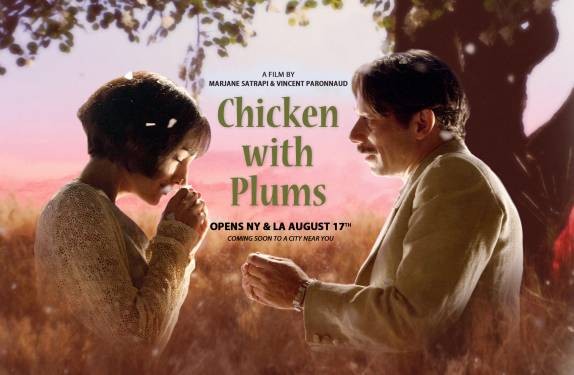
CHICKEN WITH PLUMS/ POULET AUX PRUNES
France, 2011, 96 minutes, Colour.
Mathieu Amalric, Edoardo Baer, Maria de Meideros, Golshifteh Farahani, Eric Caravac, Chiara Mastorianni, Isabella Rossellini, Jamel Debbouze.
Directed by Marjane Satrapi, Vincent Paronnaud.
Chicken with Plums is the work of writer-director, Marjane Satrapi, who made an impact with her first film, the animated Persepolis. She later made The Gang of the Jotas.She works here with fellow-director, Vincent Parannoud.
The narrative is quite complex in its presentation, using a great number of flashbacks, and even some flash-forwards to the fate of the hero’s son as he goes to live in the United States and absorbs their values and way of life.
At the centre of the film is Nasser Ali, played by Mathieu Amalric. He has had an unhappy life, an unhappy marriage to a woman who has has loved him since childhood (Maria de Madeiros). She has smashed her husband’s violin and he is unable to find a proper replacement and so decides to die. It takes eight days for him to die, going back over his life and postponing his decision, considering various ways. He remembers the love of his life and her father forbidding her to marry him. There is pathos when he actually encounters the woman, now grandmother, in the street and she claims not to know him – though she turns the corner in grief. It seems that he should now die.
Some of the flashbacks involve his protective mother, played by Isabella Rossellini.
With the complexity of the narrative, the jigsaw puzzle of his life and the audience finding the direct narrative as well as the explanations for his behaviour, the film is always interesting and challenging.
1. The work of the directors, their previous films? Their skill in animation? Incorporating animation into the narrative? The effect of the juxtaposition?
2. The title, the reference to Nasser Ali’s favourite meal, the visuals of his enjoying it?
3. The nature of the storytelling, the Persian tradition, the traditional beginnings? This film as an exercise in storytelling? Of Tehran in 1958? The narrator and his visit, hearing the story and re-telling it?
4. The portrait of Nasser Ali? In the present, his status as a violinist, reputation? Playing the violin? His wife smashing it? Going to the store, the storekeeper and his bargain, the violinist dissatisfied, returning, demanding a new violin? His meal with his brother, the discussions, the brother as a Communist and the violinist with a different perspective? The story of the violin in the country town? His decision to go? The clash with his wife, her anger, the problem of looking after their son? His taking them on the bus, the son and his exuberance, singing and going up and down the aisle? His father trying to control him?
5. Going through the market, asking directions, his son delayed with the fish? Going to the shop, the genial shopkeeper, remembering Nasser Ali’s reputation, wanting to stay, the contents of the shop, the means of subduing his son, the gift of the violin, smoking the opium? The return? His dissatisfaction with the violin? The decision not to play ever again? His death wish?
6. The eight days of his dying, each signalled? The nature of his death wish? The influences from the past? His long lost love, alienation from his wife? His music and the instrument?
7. The narrative of his last eight days, the flashbacks to the past? The significance and style of the animation? The episode in North America, his cousins, very American, giving up the traditions of Iran?
8. The various characters from his past and their influence on him: his brother, the rivalry, the arguments, the comparisons, his brother and politics, his lack of interest? His wife, their being children, his not being attracted to her, his father and the advice of a prudent marriage? The young girl, loving him, chasing him? Her delight in the arrangements for the wedding? The years passing? His lack of love her, the complaints? Her own frustration, cooking his favourite meal, yet angry with him? Smashing the violin? Their son? Her staying with him, helping him while he was dying?
9. The daughter of the shopkeeper, his seeing her, attracted to her, excuses to go the store for the repair of the clock, their various meetings, talks? The father’s disapproval? The love of his life? His being warned away, his travelling abroad, his music? Her saying that she would forget him? The significance of seeing her so many years later, her being a grandmother, with the child, in the town, his accosting her, saying that she did not know him? Her turning the corner, her grief?
10. The character of the one armed beggar and his friendship and advice?
11. The image of death, the conversations with death, death of the philosophy, deciding when to come?
12. The portrait of an eccentric man, unlikeable, talented, his review of his life, death, and finding it difficult to come to terms with death?
Published in Movie Reviews
Published in
Movie Reviews
Tagged under
Saturday, 18 September 2021 19:51
White Whale, The
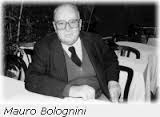
THE WHITE WHALE
Italy, 1964, episode in La Donna e una cosa meravigliosa, 102 minutes,
Directed by Mauro Bolognini.
“La balena bianca” (The White Whale), is a lurid bit of black humour in La donna e una cosa meravigliosa (Woman Is a Wonderful Thing, 1964). A circus dwarf named Eros tries frantically to murder his wife – a mountainous fat lady who gets fired out of a cannon to the tune of Ponchielli’s Dance of the Hours. All his efforts are vain; this “white whale”, like most of Bolognini’s women, is indestructible and all-powerful. Sparking a near-riot at the Venice Film Festival, this episode remains the only one Bolognini himself ever liked.
1. The impact of the film as a short story, impact in itself, as part of an omnibus film?
2. Black and white photography, music, the atmosphere of the circus, the creation of atmosphere for the story, sinister atmosphere within a circus?
3. How well did the film quickly communicate the authentic atmosphere of the circus, the various acts, the picturing of the audience, the atmosphere of thrills and dangers and audience expectation? The comic side of things, the clowns?
4. The difference with this circus and the focus of the plot: the dwarfs, the presentation of freaks, the visual images, audience response? Audience attitude towards freaks, how sympathetic, how repugnant?
5. The focus on the dwarfs in themselves, within this circus world, the contrast with normal size humans? How normal did they seem, abnormal? Mere physical abnormality but psychological and emotional normality? The comic aspects of presenting the dwarfs? The seriousness? The blend of comic and realistic? The insight into the behaviour of human nature in seeing dwarfs acting out actions and situations more associated with normal sized beings? How did the film play on the ambiguity of audience reactions?
6. Miriam symbolised as a white whale: how attractive a personality in herself, her size, the fact that she was married to Eros, the management of the circus? The humour and the skill in the various acts, especially on the tightrope? Her love for Eros? The ironic humour of her staying alive despite the poison, the explosion, the danger with the aerial trapeze? The delineation of her character? The symbol of the white whale and Moby Dick? How important fact that she could survive and that she was unkillable? The audience left with this?
7. The character of Eros, his name, the central role, his role in the circus, management and wealth, marriage to Miriam, love for her but yet her being too much for him? The humour and parody of the bedroom sequences? His being overwhelmed by her, growing to hate her, cruelty? His passion for Luciana, deceit, the outings, the parody of meeting and rendezvous, lust? Miriam as a white whale challenging him cruelly? The comic aspects of his various attempts, a would-be Bluebeard? His ultimate failure?
8. Luciana as the other woman, the importance of her being a dwarf? Her personality, her acts in the circus, her skill? Love of wealth, outings? Lust, cruelty? Her using of the pregnancy argument, blackmailing him? With the other men? Her continual defying of Eros, especially at the end with her cruel look from the trapeze?
9. Comment on the various set pieces in the circus, the encounters between Eros and Luciana, the bedroom scene with Miriam and Eros, the restaurant rendezvous, Luciana flirting with other men? The circus acts and the humour of Miriam having to ran to the toilet
10. The ironic portrayal of a romantic triangle, fidelity and infidelity, insight into human nature and relationships? The irony of the futility of Eros’s attempts on Miriam?
Published in Movie Reviews
Published in
Movie Reviews
Tagged under
Saturday, 18 September 2021 19:51
Prince of Egypt, The
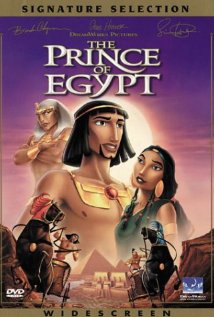
THE PRINCE OF EGYPT
US, 1998, 98 minutes, Colour.
Voices of Val Kilmer, Ralph Fiennes, Michelle Pfeiffer, Sandra Bullock, Jeff Goldblum, Danny Glover, Patrick Stewart, Helen Mirren, Steve Martin, Martin Short.
Directed by Brenda Chapman, Steven Hickner, Simon Wells.
Dreamworks Studios have produced an ambitious animation feature, designed for an adult audience as well as for younger audiences, experimenting with drawings that move away from Disney expectations to more stylised, even severer, characters. Layout is also more stylised as is the use of colour. In these achievements, The Prince of Egypt is most impressive.
The film will obviously be seen as something of a remake of Cecil B. De Mille's 1956 The Ten Commandments and a television-wise audience will be making comparisons. The most obvious is the parting of the Red Sea which was one of De Mille's more obvious use of the special effects of the time. Here it is almost the climax of the film (the giving of the Ten Commandments seems a little anti-climactic) and it is animated in super-epic proportions.
Any reading of the book of Exodus has to deal with the literary forms of the early chapters: Moses, his being wonderfully saved from massacre, his growing up in Pharaoh's court, his realisation of his heritage, his exile in Midian and experience of God in the burning bush, his confrontation with pharaoh, the plagues and the exodus itself. All these elements are dramatised in The Prince of Egypt.
One would hope that the good effect of the film is that audiences all over the world, and children who don't always have access to religious education, will become familiar with the events and themes of the Exodus.
Those who have studied Exodus and appreciate the saga elements (the dramatising and the imaginative inflating of the power of Moses over that of Pharaoh as well as the devices used to glorify the role of the Hebrews' God in their history) will have a context for enjoying this version.
However, most people will not have this background and will interpret the film in a literal way. This is always a risk with a biblical film unless audiences are alerted to the imaginative style of the storytelling. With an animated film, this is an inbuilt advantage. We know that what we are watching is a stylised interpretation. With The Prince of Egypt, this impression is enhanced by the inclusion of a number of songs (evocative of traditional Jewish melodies) and by visual references to other plays and films: the opening, with the Hebrew slaves labouring seems to be straight out of Les Miserables and there is an excitingly drawn and computer-enhanced chariot race that will have everyone thinking Ben Hur.
But there is one major worrying feature. When we read Exodus, we know that the God who is revealed in chapter 3 is a covenant God of loving mercy, justice and truth and that the rest of the scriptures will show how early responses to God as severe and wrathful will develop into a deeper awareness of the goodness and love of God.
This is not the case for many who will see the film. Here God is kind to his people but can be interpreted as vengeful and cruel to others. The plagues make exciting reading and visual display. But, with the killing of the firstborn (again drawn most effectively and bleached into a sinister monochrome), we respond emotionally to the death of children no matter how harshly we judge the actions of their parents. This is especially the case when Moses looks at the vast pictures commemorating Pharaoh's slaughter of the Hebrew children. One might ask how different is God from Pharaoh. An impression from The Prince of Egypt, without any context, is that God is vindictive, arbitrarily cruel and can sweep the Egyptians away without compunction.
Obviously that cannot be the whole story. The Prince of Egypt is quite a cinematic achievement. However, isolating the Exodus story as if this were a definitive portrait of Moses, the Hebrew people and their God, means that it may be a mixed blessing.
1. Oppression of people, massacres, slavery and the suppression of human dignity while oppressors live in comfort and luxury? Social justice issues?
2. Dramatising a biblical book? With computer-animation techniques: the look and sound of characters, the musical score and the themes of the songs, layouts and scenery, special effects eg, the chariot race, the plagues, the parting of the Red Sea? Dramatic impact of the plot? Audience knowledge of the book of Exodus?
3. Audiences identifying with Moses: his escape from death, his growing up in the wealth of the court not knowing his true origins, his encounters with his people, his violence and going into exile, his acceptance in Midian, his experience of God in the burning bush, his sense of mission, confrontation of Rameses, his former brother and friend, the plagues, his leading his people to freedom, giving the Ten Commandments?
4. The religious background: the history of the Hebrew people, their worship of their God, the nature of their God (protective of the Hebrews, destructive of the Egyptians)? The response to a God of vengeance? How did the understanding of God change over the period of Hebrew history to a more merciful and loving God?
5. Did the animation style of the film, the songs, the special effects contribute to an understanding of the events and personalities of the Exodus and the Hebrews' religious experience or put in the realm of fantasy?
6. The picture of Egypt, the kingdom, the monuments, pyramids, the slave labour to produce them, the role of the Hebrews?
7. The Pharaoh, as a father, strong, relationship with Rameses, the issue of slavery, Moses challenging him, his refusal to relent, no regrets, his death?
8.Rameses accepting young, reckless, Moses as his brother, accepting him, the bond between the two? The range of pranks? The Pharaoh’s reaction? The elaborate chariot race, the destruction, excuses?
9.Moses, as a character, the reaction of Mary and Aaron ? Tzipporah as a prisoner? Celebration, Moses arranging her escape? The discovery of his Hebrew origins, going to the building, the death of the man, the fear of the other Hebrews? Going to the desert, the experience of the burning bush, the experience of God? Meeting Tzipporah, Jethro her father, the welcome, the marriage? Singing and celebration? Moses and his decision to return, Tzipporah going with him?
10.Rameses and his reaction, welcoming him as a friend, Moses and his directness? The officials, the rods as serpents? The experience of the plagues, the effect on Rameses, the hardening of his heart? His relationship with his son? The plague of the destruction of the firstborn? The effect on Rameses?
11. The preparation of the Hebrews to leave Egypt, Miriam and Aaron, going out, the Egyptians in pursuit, Moses, at the banks of the Red See? The parting of the waves, the spectacle? Rameses and his charioteers pursuing, in the sea, the waves rolling over them? Rameses and his survival? Lament?
12. The Hebrews in the desert? Mount Sinai, the 10 Commandments and Moses presenting them?
13. The impact of the film, for believers, the non-believers, for the uninformed?
Published in Movie Reviews
Published in
Movie Reviews
Tagged under
Saturday, 18 September 2021 19:51
Abbott and Costello in Hollywood
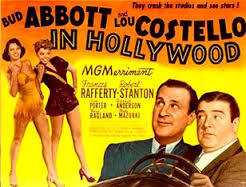
ABBOTT AND COSTELLO IN HOLLYWOOD
US, 1994 1944, 95 minutes, black-and-white.
Bud Abbott, Lou Costello, Frances Rafferty.
Directed by S.Sylvan Simon.
This is one strictly for fans of Abbott and Costello only.
Abbott is the straight man, this time an instructor at a barber’s shop to Hollywood and the stars. Costello is doing a course, has been years at it, still failing, especially trying to shave a balloon which bursts when he wields the razor and when he tries with heated knife. This leads to all kinds of hijinks, especially with Costello wanting a date with one of the attendants, becoming friends with one of the actresses, falling foul of a jealous singer, trying to promote a new young singer interested in a career and in love with the actress. It involves going to the studio, being mistaken for a dummy, all kinds of pratfalls, and eventually his being needed as a substitute and stand-in for the film.
In the meantime, the ageing singer, jealous of the singer, tries all kinds of plots to ruin his career, but he is thought to be killed, so Costello disguises himself, meets the disguised actor in a bar and there is a mutual exposure. But the actor does himself in, is taken, and the young man gets the part.
In the meantime, Bud Abbott is trying to control Costello whenever the plot needs it.
A typical comedy of the comedians (perhaps anticipating some of the antics of Martin and Lewis, as the straight man and Lewis with his awkwardness and pratfalls).
Published in Movie Reviews
Published in
Movie Reviews
Tagged under
Saturday, 18 September 2021 19:51
Hitting a New High
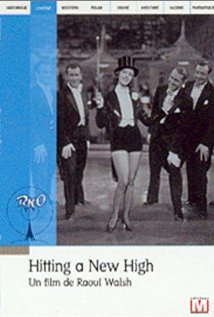
HITTING A NEW HIGH
US, 1957, 86 minutes, Black and white.
Lily Pons, Jack Oakie, John Howard, Edward Everett Horton, Eduardo Ciannelli, Eric Blore.
Directed by Raoul Walsh.
This film is a curiosity item. It was produced by RKO who hoped that opera singer, Lily Pons, would become a screen star – in the vein of Jeanette Mac Donald. It was not to be. While Lily Pons had a successful singing career, she did not have a charismatic personality screen and had a rather harsh speaking voice.
This film was directed by Raoul Walsh, who had been directing films since 1913 and was to continue into the 1960s, with a wide range of films, including tough thrillers at Warner Brothers as well as many Westerns.
Jack Oakie was a contemporary comedian and was to have a high point in his career with Charlie Chaplin, where they mocked Hitler and was Mussollini in The Great Dictator.
Popular comedian, Edward Everett Horton, usually in supporting roles is quite a prominent role in this one, using his usual mannerisms, the touch of dithering, and exposing pomposity. He is matched by comedian Eric Blore.
Nowadays the comedy of this film seems somewhat obvious and heavy-handed, a long opening with Horton wanting to be filmed with a lion – only to find that a live lion had been sent for the photoshoot . There is an expedition to Africa where Horton wants to bag a giraffe. Instead, with the connivance of Oakie, the opera singer poses as a jungle girl and is brought back to the United States with great publicity. She had been cabaret singer who wanted to enter opera, and this is an opportunity. Part of the tangles of the plot include her still having to sing in the New York club, attracting the attention of an entrepreneur played by Eduardo Ciannelli, and singing at a social occasion, exposing Horton and gaining a career.
There is a sub-plot remains where Lily Pons is in love with the orchestra conductor, John Howard, but has various clashes with him as regards career.
Not essential viewing, but a 1937 curiosity.
Published in Movie Reviews
Published in
Movie Reviews
Tagged under